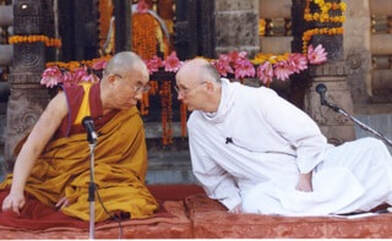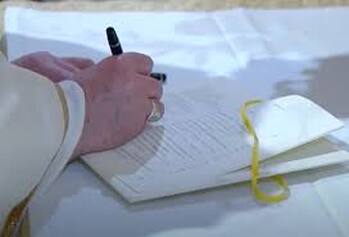
Interfaith relations have changed over the years and some Christian Churches, including the World Council of Churches, are now inclined to talk about interreligious dialogue rather than interfaith. The Catholic Church has always used the term interreligious dialogue ever since the Second Vatican Council set the Church on the path of dialogue. The body that deals with dialogue is called the Pontifical Council for Interreligious Dialogue, not Interfaith Relations. This quite clearly shows the parameters of this dialogue and distinguishes it from other dialogues such as that with Marxism and New Religious Movements. What has led some of the other Christian Churches to speak of interreligious dialogue has been the development of the interfaith movement which has brought about government funding, a focus on social cohesion and security and an extension of the dialogue to include people of non- religious beliefs in keeping with equality legislation. Interreligious dialogue differentiates the pastoral and theological concerns of religions from that of the public square.
Traditionally a four –fold model of interreligious dialogue proposed by the Catholic Church in its document ‘Dialogue and Proclamation’ has been accepted by the Christian churches: the dialogue of theological experts, the dialogue of religious experience, the dialogue of action and the dialogue of living together. I’ve been lucky to engage in all of these at some level and have come to value their different contributions to expanding our understanding of others. I’ve enjoyed the challenge of some of the theological dialogues, the exploration of the similarities and differences between religions and the opening of new horizons in my own faith. It’s an area which is vital but sadly lacking in Scotland since the closure of the Centre for Interfaith Studies at Glasgow University.
The Dialogue of religious experience has included inter-monastic dialogue which for decades now involved Catholic and Buddhist monastics not just in dialogue but in visiting one another’s monasteries and participating in their way of life. I’ve had my own taste of that in my visits to Samye Ling Tibetan Monastery and Holy Isle and my years of deep and honest conversation with my good friend Ani Lhamo. So too I’ve been able to have nourishing and inspiring conversations with my many interfaith friends and can sometimes be more honest with them about my experience of faith than I can with those who share my religion.
Then there is the dialogue of living together and sharing ordinary everyday life as neighbours or co-workers. Living as we now do in a multi-faith, pluralistic society this is a dialogue which many engage in while not naming it as such. This is the dialogue that cements friendships and is the bedrock of a respectful and open society. And finally there is dialogue of action, of engaging with one another for social justice and the common good. This is one close to the heart of Pope Francis who for years now has spoken about the reality of fraternity (sic), of the interconnectedness of all humanity and our need for all to work together to overcome the sufferings and injustices that afflict our world. So is Pope Francis more interested in interfaith than interreligious dialogue? This brings us back to where we started and that statement on climate change.
There is no doubt that living together in a world that is not just plural but also unjust is a concern for religions. For the sake of the future of our planet and humanity it’s essential that we work together and contribute to a just and peaceful society. We need, I think, to learn to speak a language that will be understood in the market place and not revert to traditional dogmatism. But we need to speak from our own vision and beliefs about the sacredness of human life in all its aspects and show how our contribution to the work for justice comes from a vision that can be inspiring and liberating - but also reveals the shortcomings of those who uphold and advocate it. Religions speaking together for the sake of justice need to be humble about how they have contributed to injustice. They should be working with people of all faiths and none but must also share, I think, their own vision and belief that shows that working for justice is an integral part of who they are. In doing this they have something significant to add to their dialogue with the world.



 RSS Feed
RSS Feed
